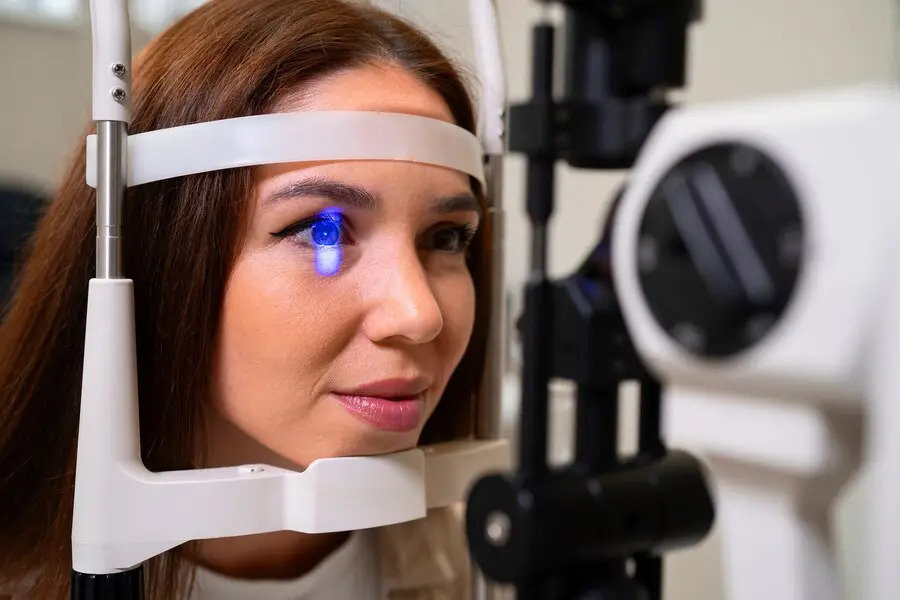Eye discomfort is often brushed aside as something minor—a reaction to dust, too much screen time, or fatigue. But when that irritation lingers or worsens, it could be a sign of something far more serious. Uveitis, an inflammatory condition of the eye, often begins subtly but can progress rapidly if not addressed with proper medical attention.
Many individuals turn to over-the-counter eye drops hoping for quick relief, unaware that Uveitis needs targeted treatment guided by an experienced eye specialist. This blog explores why early diagnosis and expert intervention are critical to preserving your vision.
Understanding Uveitis: More Than Just Inflammation
- Uveitis refers to inflammation of the uvea, the middle layer of the eye that includes the iris, ciliary body, and choroid.
- It can be caused by infections, autoimmune diseases, trauma, or may even be idiopathic (with no known cause).
- Symptoms often include redness, blurred vision, light sensitivity, eye pain, and floaters—yet these can mimic other common eye conditions.
Ignoring these signs or self-treating them with generic eye drops may temporarily mask symptoms but won’t address the root cause.
The Danger of Delayed Uveitis Treatment
- Over-the-counter remedies might soothe the surface of the eye, but they cannot penetrate deeper structures affected in Uveitis.
- Inadequate or incorrect treatment can lead to complications like glaucoma, cataracts, macular edema, or even permanent vision loss.
- Timely and proper Uveitis Treatment can prevent long-term damage and help maintain healthy vision for years to come.
When inflammation is left unchecked, it becomes more than just a temporary problem—it becomes a threat to vision itself.
Why Uveitis Demands a Specialist’s Evaluation
- Eye specialists, especially uveitis-trained ophthalmologists, use advanced imaging and diagnostic tools that go beyond a basic eye exam.
- They can identify whether the Uveitis is anterior (front of the eye), intermediate, posterior, or pan-uveitis, which affects the entire eye.
- Accurate classification is essential for deciding whether treatment should involve steroid drops, oral medications, injections, or immunosuppressive therapy.
Each eye is unique, and every case of Uveitis requires a customized approach—not a one-size-fits-all solution.
Tailored Uveitis Treatment: What a Specialist Offers
- Specialists create a step-by-step care plan based on the cause, severity, and recurrence pattern of the inflammation.
- Treatment might include corticosteroids, immunomodulators, biologics, or antivirals, depending on the underlying issue.
- Monitoring and follow-up are just as important—Uveitis can return unexpectedly, and long-term management reduces relapse risk.
Self-medication lacks this kind of personalization, putting your eyes at unnecessary risk.
The Role of Advanced Diagnostic Tools
- A slit-lamp exam, optical coherence tomography (OCT), fluorescein angiography, and laboratory tests are often used in evaluation.
- These tools help detect hidden inflammation, swelling in the retina, or damage to the optic nerve—conditions invisible in a regular check-up.
- Accurate diagnosis enables early Uveitis Treatment that minimizes complications and preserves vision quality.
Over-the-counter solutions cannot offer this level of insight, leading to missed or delayed interventions.
Systemic Causes Need Systemic Care
- Uveitis is often linked with systemic conditions like rheumatoid arthritis, lupus, sarcoidosis, or inflammatory bowel disease.
- A specialist works in collaboration with rheumatologists, internists, or infectious disease experts to address both eye and systemic health.
- This multidisciplinary care is not available through self-treatment or general eye care providers.
Your eyes are a window to your overall health—Uveitis can be the first clue something more is going on.
Pediatric Uveitis: A Delicate Case Requiring Expertise
- In children, Uveitis can be asymptomatic until significant damage has already occurred.
- Pediatric cases need a gentle yet proactive treatment strategy, often requiring sedation for imaging and child-specific dosing plans.
- Specialists experienced in pediatric Uveitis Treatment can safeguard a child’s vision while minimizing long-term medication side effects.
In such sensitive cases, only expert hands can offer the precision and care required.
Chronic and Recurrent Uveitis: Managing the Long Game
- Uveitis may not be a one-time event; it often recurs and needs ongoing monitoring.
- A specialist will adjust treatment regimens over time to minimize flare-ups while reducing medication side effects.
- This ongoing relationship ensures early detection of any recurrence and fine-tuning of long-term therapy.
Such chronic care management is far beyond the scope of over-the-counter options.
Emotional Support and Patient Education
- Dealing with a chronic eye condition can be stressful, especially when it affects your ability to read, drive, or work.
- Specialists not only treat but also educate patients about warning signs, lifestyle adjustments, and compliance with treatment.
- Supportive care helps patients feel confident and proactive in managing their eye health journey.
Empowering patients through knowledge is part of healing—and it's something you don’t get from a bottle of eye drops.
Choosing the Right Eye Hospital: Where Expertise Meets Compassion
- Not all eye clinics are equipped to handle complex inflammatory conditions like Uveitis.
- A super speciality eye hospital offers access to subspecialists, high-end diagnostic facilities, and coordinated care under one roof.
- Patients benefit from evidence-based treatment, real-time monitoring, and a multidisciplinary team focused on preserving vision.
When it comes to something as delicate as Uveitis Treatment, the right hospital truly makes a difference.
Conclusion:
Vision is irreplaceable. While it may be tempting to reach for over-the-counter drops when eye discomfort strikes, Uveitis is not a condition that should ever be self-treated or ignored. The risks of permanent vision loss are real—but they are also preventable with timely, expert-led care.
For those seeking specialized, reliable, and compassionate eye care, Maxi Vision Eye Hospital stands as a super speciality eye hospital committed to delivering the highest standard in Uveitis Treatment. With advanced diagnostics, experienced uveitis specialists, and a holistic patient care model, Maxi Vision helps patients protect what matters most—their sight.





Comments